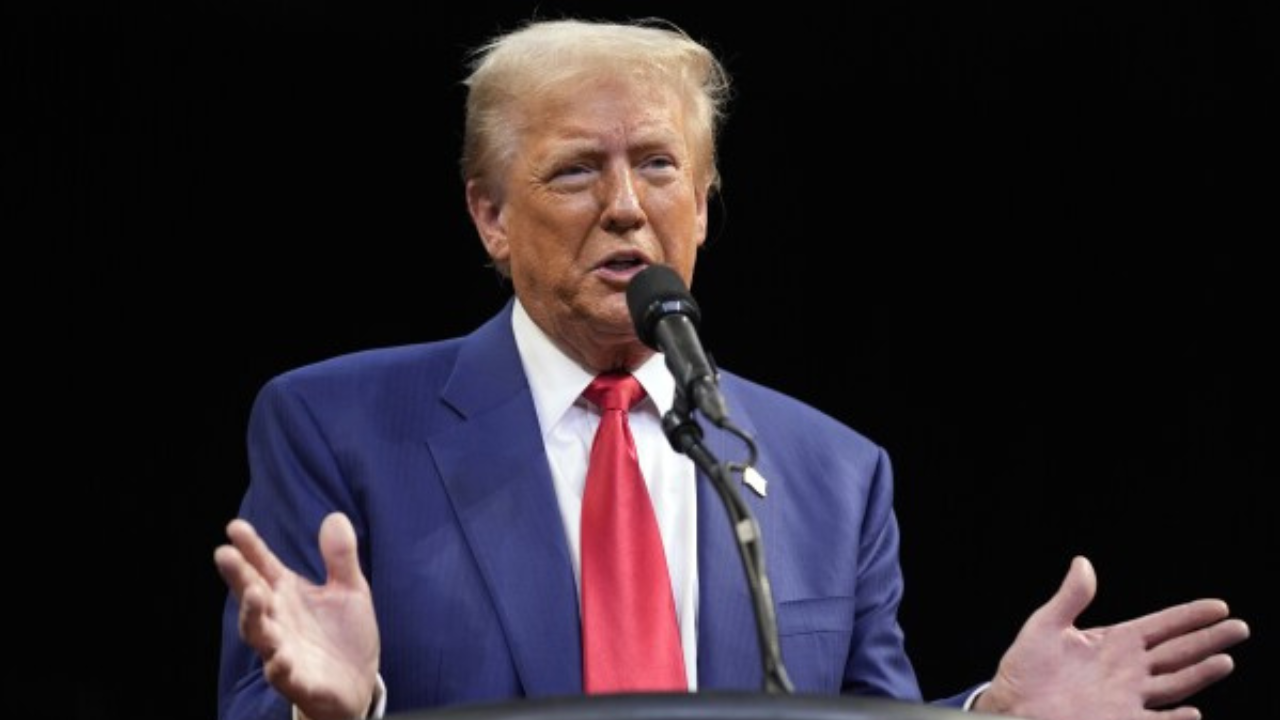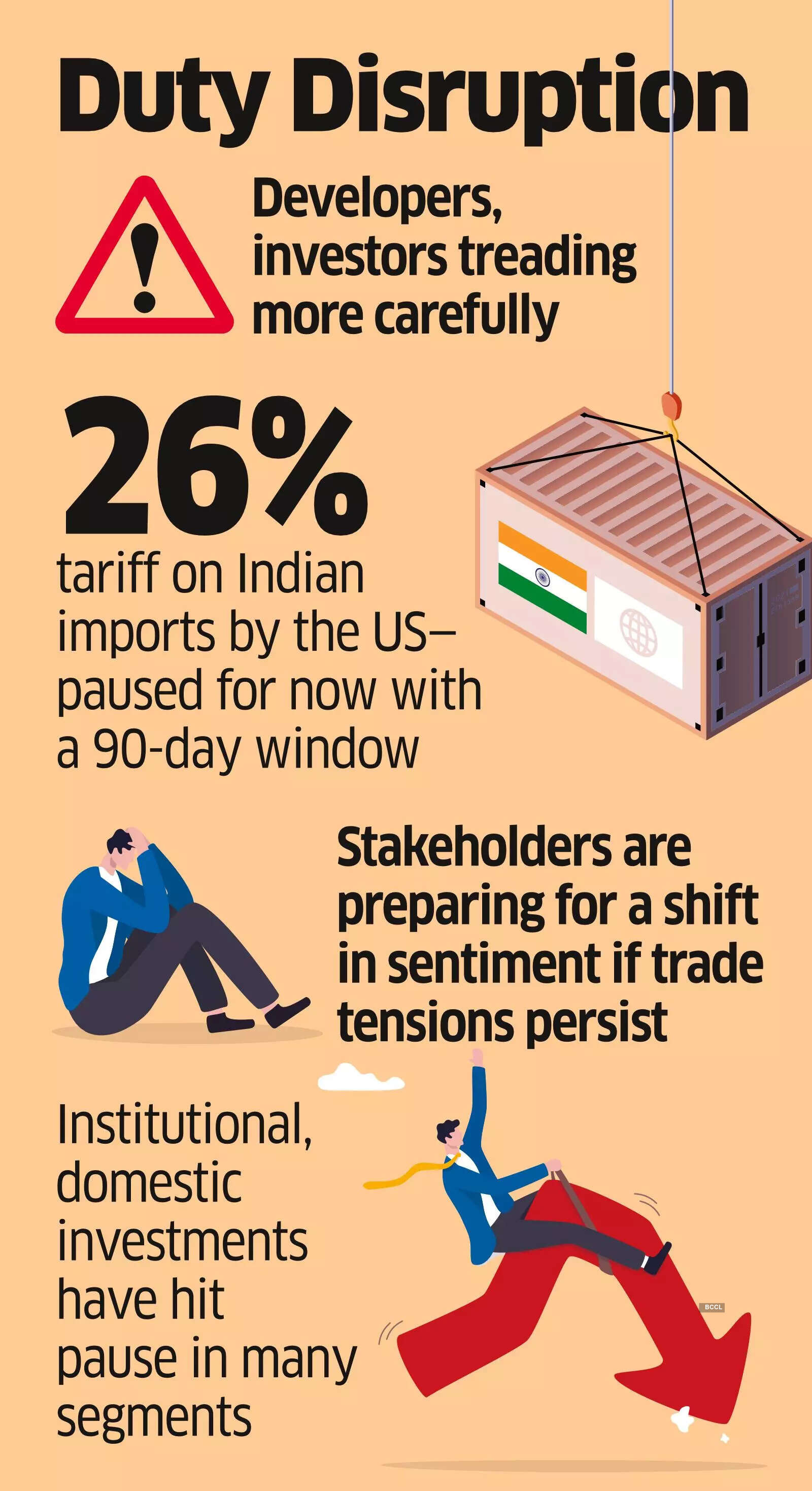
US President Donald Trump’s tariff fury is upheaving India’s realty sector, sparking fresh concerns around office leasing, GCC expansions, institutional investments, and homebuyer sentiment.
While services have been spared for the moment, helping keep demand steady in cities like Bengaluru and Mumbai, the uncertainty is making developers, investors and companies tread more carefully.
“There is no proposal to tax services by the US government yet, and we do not know how the tax on goods will pan out after the 90-day pause,” said Anurag Mathur, CEO, Savills India. “Whilst we do not foresee any impact to office absorption, including GCC expansion, at this stage, just the uncertainty and subdued sentiment could slow down expansion and impact the industry.”
Trump slapped 26% so-called ‘reciprocal tariffs’ on Indian exports to the US. He has since declared a 90-day pause on all tariffs, retaining only a 10% ‘baseline’ tariff, except China, where tariffs have been raised to 245%.
The proposed tariffs pose potential long-term implications for trade-linked employment, capital inflows, and infrastructure growth in India. While the immediate impact is muted, real estate stakeholders are preparing for a shift in sentiment if global trade tensions persist through 2025.
Despite the overarching cloud of caution, India’s office market showed surprising resilience in Q1 2025.
The combined effect of tightening US visa policies and elevated tariffs on China is redirecting corporate realignment strategies, with India emerging as a preferred global hub for back-office, IT, R&D, and analytics operations, according industry experts.
India’s office realty sector recorded 15.9million sq ft of gross absorption across top six cities in the March quarter, marking a 15% year-on-year growth, showed data from Colliers and Real Estate Intelligence Service (RE). Significantly, 46% of this leasing activity came from IT services, Global Capability Centres (GCCs), and tech-driven firms ramping up their offshore delivery centres.

“Restrictions on talent mobility are forcing firms to rethink their global workforce distribution. India is becoming the default choice for scaling operations due to cost efficiencies and talent availability,” said the managing director of a leading property consultancy firm, who did not wish to be named. “The deals have not been called off yet, but the Q2 looks very uncertain with all decision making on hold.”
Experts say offshore models are no longer tactical but central to enterprise strategy. Sectors like banking, healthcare IT, and enterprise tech are deepening their India presence for engineering, analytics, cybersecurity, and backend operations.
In 2025, CBRE anticipates GCCs to account for 35-40% of total office space absorption across top cities. North American firms continue to be the mainstay of GCCs in India.
While commercial real estate has stayed afloat, residential demand appears to be undergoing correction in some markets.
Data from PropEquity showed housing sales fell by 23% in Q1 2025, while new supply declined by 34%. Hyderabad recorded the steepest decline in sales at 47%, followed by Mumbai 36%, Pune 33%, and Kolkata 28%. Bengaluru and Delhi-NCR were relative outliers, managing to stay largely stable amid the broader correction and affordability issues.
Sunil Pareek, executive director, Assetz Group said global tariff moves like those proposed by Trump can create short-term uncertainties and influence sentiments in some sectors. “We have not seen any visible impact on site visits, enquiries, or closures in our residential projects. Since these tariffs don’t directly affect the services sector, which remains a key driver of housing demand in metros like Bengaluru, the sentiment impact on residential real estate has been minimal,” he said.
Contrary to expectations, institutional and domestic investments across segments like office, warehousing, residential and alternative asset classes have gone into the wait-and-watch mode till further clarity emerges.
“If the uncertainty continues for longer, it could eventually affect hiring plans in the services sector, especially for companies exposed to globally impacted industries,” said Pareek.
Office assets investments continued to rise in the March quarter, reflecting investor confidence in India’s long-term growth narrative with global REITs, sovereign wealth funds, and pension funds remaining bullish on the country’s commercial assets.
The warehousing and logistics segment remained relatively quiet during the quarter, though analysts believe it could see renewed momentum in the coming months. With potential supply chain realignments triggered by tariffs and geopolitical events, India could see a surge in demand for Grade A industrial space if companies look to de-risk China dependency.
“US tariffs on India remain relatively lower than on some other markets; these trade shifts could accelerate global manufacturing moving to India, boosting demand for industrial and warehousing spaces and further strengthening the country’s logistics ecosystem,” said Anshul Singhal, cofounder and managing director of Welspun One, earlier this month.












